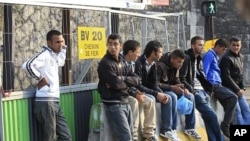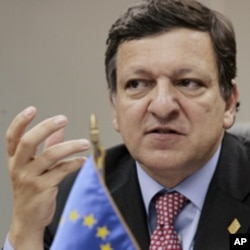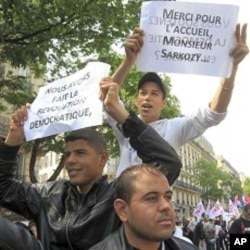European Union interior ministers meet in Brussels Thursday to discuss how to handle a wave of migrants flooding into their countries following the Arab uprisings in North Africa.
Fading hopes
Near a highway on the edge of Paris, dozens of mostly Tunisian immigrants are camped out in a dusty park, living on sandwiches handed out by volunteers - and hope for a better life in Europe that is quickly fading.
Hamed Ben Garden, 25, is from the Tunisian island of Djerba. He left Tunisia in February, heading to the Italian island of Lampedusa by boat - and then by train across Italy's border with France.
Ben Garden says he thought France would give him food and shelter, until he could find a job. But he cannot get legal papers. And without papers, he cannot find a job.
European Union countries are now discussing how they should deal with Ben Garden and roughly 25,000 other North Africans who have flooded into the region since the Arab protests earlier this year.
Tougher stance
The European Commission, the EU's executive arm, has proposed toughening the 26-year-old Schengen agreement that allows for passport-free travel among 22 member nations, plus Switzerland, Iceland and Norway.
In a speech before the European Parliament Tuesday, commission President Jose Manuel Barroso said the influx of African migrants highlighted weaknesses in Schengen. The commission has proposed introducing temporary border controls but Barroso says dismantling Schengen would be a disaster.
"I firmly believe that to do so would catastrophically undermine not just what Europe has constructed over the last 61 years, but sabotage the viability of our efforts to build a prosperous and integrated Europe for the future," Barroso said.
Influx of migrants
A joint letter by French President Nicolas Sarkozy and Italian Prime Minister Silvio Berlusconi prompted the Schengen discussions. The two leaders want the Schengen treaty to be modified. Italy has been the main country hit by the influx of North and sub-Saharan African migrants whose numbers surged following this year's Arab Spring.
Pierre Henry, head of the French immigration support group, France Terre d'Asile, says about half of the African migrants who arrived in Italy this year made their way to France.
Henry compares their plight to the thousands fleeing across the borders of war-torn Libya into Tunisia in recent weeks. He says Tunisia welcomed and sheltered these people. By contrast, he says France and Europe have offered a police solution to Tunisian and other migrants arriving on their shores that he says is undignified.
Anneliese Baldaccini, European immigration expert for rights group Amnesty International, agrees that Europe should be welcoming and not shunning these migrants.
"We would like to see the European Union making a commitment towards governing the situation in a way that is consonant with the values that it stands for - taking its fair share in welcoming people, in receiving them and providing basic humanitarian needs," Baldaccini said.
Political bind
Hugo Brady, a Brussels-based analyst for the think-tank Center for European Reform, says French and Italian leaders who urged toughening Schengen are in a political bind - in part because of the rise of far-right, anti-immigration parties.
But Brady doubts border-free travel in Europe will be scrapped.
"The practicalities of the everyday won't allow for it," noted Brady. "People value the convenience of being able to travel around Europe without a passeport. It's a significant achievement that I think very few people will want to roll back. "
Among the Tunisians in the Paris park, Europe's tough welcome has been hard to endure.






